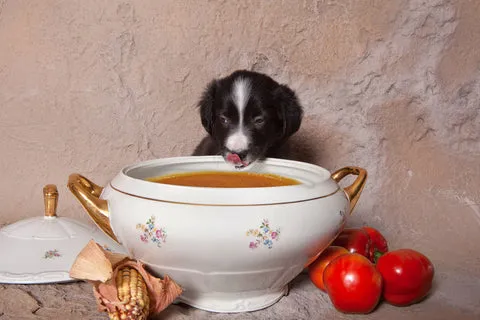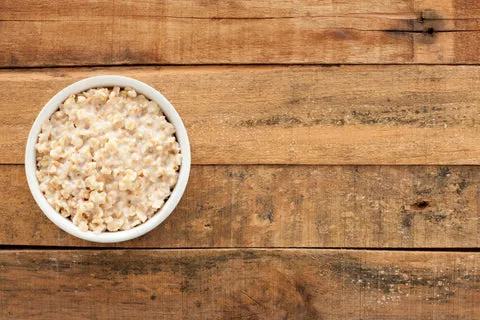Welcoming a new puppy into your home is an exciting time, but like human babies, puppies can sometimes experience tummy troubles. An upset stomach in a puppy can be distressing for both of you, often manifesting as vomiting, diarrhea, or a loss of appetite. Knowing what to feed your furry friend when they’re feeling unwell is crucial for their comfort and quick recovery. Providing the right nutrition is vital to boost their energy levels and aid their healing process, especially since their regular food might be unappealing when they feel under the weather.
This guide, brought to you with insights from pet care experts, will outline the best bland yet nutritious foods to offer your puppy when they have an upset stomach. We’ll also explore suitable food options for puppies prone to digestive issues or allergies, helping you keep your little one happy and healthy. Remember, if your puppy’s condition persists or worsens, always consult your veterinarian for professional advice. For more detailed information on puppy diets, consider exploring what can a one month old puppy eat.
Understanding Your Puppy’s Upset Stomach
Puppies, with their developing digestive systems, are particularly susceptible to upset stomachs. Common causes range from dietary indiscretions (eating something they shouldn’t), sudden changes in food, stress, parasites, or even more serious underlying health issues. Recognizing the signs early – such as lethargy, repeated vomiting, persistent diarrhea, or abdominal pain – is important. While a bland diet can help manage mild cases, prolonged symptoms warrant a vet visit.
Top 10 Bland and Nutritious Foods for Puppies with Upset Stomachs
When your puppy has an upset stomach, a plain, bland diet is usually the best approach. Having a few healthy, nutritious options ready can help you be prepared to nurse them back to health. Here are ten excellent, failsafe options that are gentle on your puppy’s sensitive digestive system and can aid their recovery.
1. Boiled White Meat (Chicken or Turkey)
Plain white meat, such as lean chicken or turkey breast, is an ideal option for a puppy with an upset stomach because it is easy to digest and low in fat. It provides essential lean protein, which can help soothe your puppy’s tummy. Always remember to remove any skin or bones from the meat before serving to eliminate choking hazards and make it easier for their digestive system to handle.
To prepare the meat for your puppy, rinse it thoroughly under cold water, remove any excess fat, skin, or bones, and then place it in a pot covered with water. Bring to a boil, reduce the heat, and simmer for 15-20 minutes until thoroughly cooked. Once cooked, drain the water and cut the meat into small, bite-sized pieces for easier digestion. Allow it to cool completely before serving, either alone or mixed with a small amount of white rice or cooked vegetables. This simple preparation ensures your puppy gets vital nutrients without irritating their sensitive stomach.
2. White Rice
White rice is a staple ingredient in many dog foods and is an excellent choice when your puppy is feeling unwell. While brown rice is generally more nutritious, the blandness and easily digestible nature of white rice make it a safer option for a sick puppy. It’s the perfect accompaniment to boiled chicken or turkey.
If your puppy is experiencing diarrhea, white rice can also help to bind their stools, assisting their digestive system in returning to normal. To cook the rice, rinse it under cold water, then add it to a large pan with two parts water to one part rice. Bring to a boil, then reduce to a simmer, cover, and cook on low heat for about 18 minutes, or until all the water is absorbed. Allow it to rest and cool, then fluff with a fork before serving. Avoid adding any spices or butter.
 Chihuahua sitting beside a bowl of food
Chihuahua sitting beside a bowl of food
3. Sweet Potatoes
Plain, cooked sweet potatoes are rich in vitamins, fiber, and are incredibly gentle on a puppy’s stomach, making them an excellent choice for soothing their digestive tract. They can help improve your puppy’s overall health by supplying essential calcium, iron, and magnesium, which are crucial for growth and recovery.
It’s vital not to feed your puppy raw sweet potatoes, as these are harder to digest and could further upset their stomach. Instead, peel the skins, chop the potatoes into small chunks, and add them to a pan of boiling water. Boil until they are very soft, then drain and mash them thoroughly. Serve them to your puppy once they have cooled to a safe temperature. Sweet potatoes offer a comforting and nutritious option for a struggling puppy.
4. Pumpkin
Much like sweet potatoes, plain pumpkin is highly effective in helping to cure an upset stomach and make a sick puppy feel better. It is rich in vitamins that help boost your puppy’s immune system and is full of fiber, which can help regulate digestion and soothe irritation in the gut.
You can give your puppy up to four tablespoons of plain canned pumpkin (not pumpkin pie filling, which contains sugar and spices) with their regular meal, or alongside their bland chicken and rice diet, to support their recovery. Ensure there are no added sugars, spices, or other ingredients that could irritate your puppy’s sensitive stomach. Canned pumpkin can be as effective as fresh, provided it’s 100% pure pumpkin. For more guidance on what foods are generally safe, you can review what food is ok for dogs to eat.
 Husky with a pumpkin slice smile
Husky with a pumpkin slice smile
5. Homemade Bone Broth
Bone broth is an excellent choice for sick puppies as it provides essential nutrients and minerals, such as sodium and potassium, and can significantly aid hydration, which is crucial when a puppy is vomiting or has diarrhea. Its low carbohydrate content makes it gentle and easy to digest for puppies with an upset stomach.
To prepare bone broth for your puppy, add beef, pork marrow bones, or chicken/turkey bones to a large cooking pot. Cover them with a few inches of water and cook on low heat for 20-24 hours. Once finished, strain the liquid to remove all bones and serve the cooled broth. Remember to avoid using garlic or excessive salt during cooking, as these ingredients can further upset your puppy’s stomach or be toxic.
 Puppy licking a bowl of soup
Puppy licking a bowl of soup
6. Baby Food
If your puppy is struggling with their stomach and has a poor appetite, stage 2 meat-based baby foods, such as plain chicken, lamb, or turkey, can be an effective and appealing feeding choice. Baby food is easy to chew and digest, making it gentle on a sensitive stomach and potentially helping to ease diarrhea.
However, when offering baby food, it is absolutely essential to avoid any products that contain ingredients or additives toxic to dogs, especially garlic or onion powder. Always read the label carefully. If you are ever unsure about the safety of certain ingredients in your chosen baby food, consult your veterinarian for further advice to ensure your puppy’s safety.
 Doodle puppies eating from a plate
Doodle puppies eating from a plate
7. Fish
Fish is an excellent source of healthy fats, including Omega-3 fatty acids, and essential vitamins that can significantly boost your puppy’s health and immune system, especially when they’ve been struggling with an upset stomach. The strong, appealing smell of fish can also entice your puppy to eat after they may have lost their appetite due to illness.
The best way to prepare fish for your puppy is by poaching it. Similar to boiling chicken, add boneless fish fillets to a pan of water, bring it to a boil, then reduce the heat and simmer for 10-15 minutes until it’s thoroughly cooked and flaky. Crucially, remove all bones before serving and cut the fish into small, manageable pieces. This ensures it’s safe and easy for your puppy to digest.
8. Oatmeal
Plain, cooked oatmeal, made from rolled oats, can be a comforting and effective food to soothe your puppy’s upset stomach. It is high in soluble fiber, which can help regulate digestion, particularly if your puppy is experiencing constipation, and contains antioxidants that are beneficial for reducing stomach inflammation.
While oatmeal is a good option, moderation is key. Oatmeal is rich in fiber, and giving your puppy too much can potentially exacerbate their stomach upset or lead to further digestive discomfort. Therefore, introduce it sparingly and in small quantities to observe how your puppy tolerates it. Ensure the oatmeal is cooked with water, not milk, and contains no added sugar, salt, or flavorings.
 A bowl of oatmeal on a wooden table
A bowl of oatmeal on a wooden table
9. Yoghurt
Plain, unsweetened yogurt, especially varieties rich in live active cultures, is an excellent food for a puppy with an upset stomach. It is packed with probiotics, which are beneficial bacteria that aid in digestion and support a healthy gut microbiome. If your puppy is experiencing constipation, the probiotics in plain yogurt can help to regulate their digestive system and promote more consistent bowel movements.
Plain, natural yogurt is readily available at most local stores or supermarkets, making it a convenient option if your puppy suddenly becomes ill. It can even be frozen and served as a cool, soothing treat on a warm day, which might appeal to a puppy with a decreased appetite. Always double-check that the yogurt contains no artificial sweeteners, especially xylitol, which is highly toxic to dogs.
 Puppy with yogurt on its beard
Puppy with yogurt on its beard
10. Eggs
As long as your puppy isn’t actively vomiting, eggs are an ideal food choice when they have an upset stomach. They are gentle on the digestive system and provide a high-quality source of protein, essential for recovery and maintaining muscle mass. Furthermore, eggs are a fantastic energy booster, which can be particularly helpful if your puppy feels a little lethargic after an illness.
The best ways to cook eggs for your puppy to ensure they are gentle on its stomach are scrambled without butter or oil, or simply boiled. Avoid any seasonings. However, if your puppy is experiencing active vomiting, it’s best to avoid eggs completely and stick to even blander options or consult your vet. For broader information on what human foods are safe, you might find what human food can my dog eat useful.
Preventing Future Upset Stomachs: Food Options for Sensitive Puppies
If your puppy regularly suffers from an upset stomach, or if they are frequently sick, it’s highly recommended to consult your veterinarian. They can help determine if there are underlying food-related or breed-specific allergies causing these persistent issues. While regular kibble can be problematic for some dogs, many specialized food options are designed for sensitive tummies. For ongoing issues, you might also find insights in what to give a sick puppy to eat.
Cold Pressed Dog Food
Cold pressed dog food offers a great alternative to traditional kibble, especially beneficial if your puppy suffers from food-related allergies or sensitivities. This form of dry food undergoes minimal processing at a much lower temperature than conventional kibble, which helps to preserve its nutritional value more effectively.
Due to its unique manufacturing process, cold pressed dog food breaks down easily in the digestive system, making it ideal for sensitive stomachs. It’s designed with improved all-round health in mind, aiding digestion and breaking down at a similar rate to raw food, meaning it can be easily integrated alongside a raw diet. Available in a range of flavors, including options like white fish, salmon, and chicken, cold pressed food can be a perfect choice for keeping your puppy happy and healthy. Many brands also offer grain-free options, which are excellent for puppies with grain-related allergies, providing them with nutritionally dense food that won’t upset their tummies.
Insect Protein Cold Pressed Dog Food
Complete and nutritionally balanced, insect protein cold pressed dog food is created using the same gentle pressing method as meat protein ranges. This lower-temperature processing helps retain maximum nutritional value, which significantly aids digestion and makes it very suitable for puppies with sensitive stomachs.
Insects are not only a sustainable protein source but also often contain more protein than traditional sources like chicken or beef, ensuring your puppy doesn’t miss out on essential nutrients. Crucially, insects are often hypoallergenic and low in purines, making them an ideal food source for puppies with sensitivities or meat-related allergens. Like other cold pressed options, insect protein varieties break down efficiently in the digestive system and can be fed alone or alongside a raw food diet.
Raw Frozen Dog Food
If your puppy is a fussy eater or exhibits sensitivities to their current kibble, a raw food diet can be an excellent way to introduce a significant dietary change. Raw food is typically made from natural ingredients that have undergone minimal processing and are often grain-free, which can greatly aid digestion and contribute to a healthier coat, skin, and overall well-being.
Many raw frozen dog food options come in various mixes. For instance, an 80/10/10 mix (80% meat, 10% offal, 10% bone) or a 70/10/10/10 mix (with added vitamins and minerals) allows you the flexibility to mix with your own vegetables and supplements. This customization makes it easier than ever to tailor your puppy’s food precisely to their specific needs and known allergies. Explore more options for what your dog can have in general through what foods can a dog have.
When to Consult Your Veterinarian
While the foods listed above can help manage a puppy’s upset stomach, it’s crucial to know when professional medical attention is needed. If your puppy’s vomiting or diarrhea persists for more than 24-48 hours, if they appear lethargic, show signs of pain, refuse to eat or drink, or if you notice blood in their stool or vomit, contact your veterinarian immediately. Early intervention can prevent more serious health complications and ensure your puppy receives the best possible care.
Conclusion
Caring for a puppy with an upset stomach requires patience, careful observation, and a thoughtful approach to their diet. By offering bland, easily digestible foods like boiled white meat, white rice, sweet potatoes, pumpkin, and bone broth, you can help soothe their digestive system and support their recovery. For puppies with ongoing sensitivities or allergies, exploring specialized diets such as cold pressed or raw frozen foods can provide long-term relief and optimal health. Always prioritize your puppy’s well-being and remember that consistent or severe symptoms warrant an immediate visit to your veterinarian. Providing proper nutrition and timely care are the cornerstones of a happy, healthy puppyhood.
